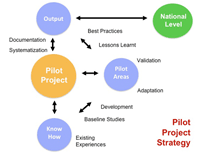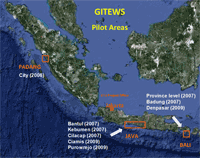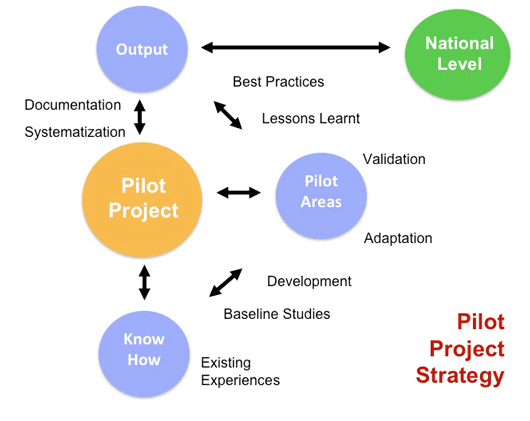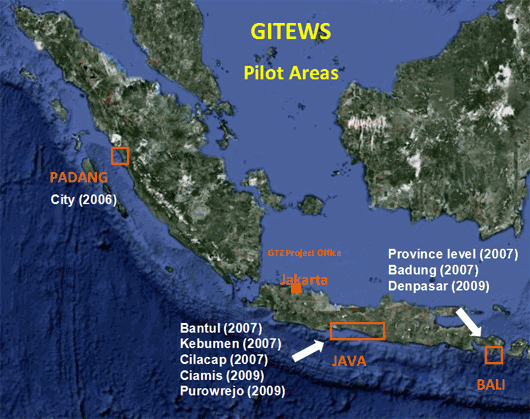Capacity Development in Local Communities
From June 2006 to December 2010, the pilot project "Capacity Development in Local Communities" has engaged in the development of warning mechanisms and tools for tsunami preparedness and response to warnings in the framework of the establishment of the Indonesian Tsunami Early Warning System (InaTEWS). The project has been implemented by the Deutsche Gesellschaft für Internationale Zusammenarbeit (GIZ) GmbH (German Technical Cooperation) together with its Indonesian partners at national and local levels within GITEWS.
The project "Capacity Development in Local Communities" is part of GITEWS Capacity Building which aimed to strengthen the individual and institutional capacities to ensure that all tasks related to the implementation, maintenance and expansion of the EWS can be fulfilled. Within GITEWS Capacity Building, Capacity Building International (InWEnt) and United Nations University (UNU - EHS) additionally implemented higher-level education programmes and technical training programmes to provide the skills required to operate the system and to upgrade it in the future. The Federal Institute for Geosciences and Natural Resources (BGR) supported the development of organizational structures and inter-institutional coordination within InaTEWS.
Project Concept & Strategy
The project concept is based on the UN-ISDR framework for Early Warning and focuses on Preparedness in the framework of disaster risk reduction.

The project used a piloting approach to develop appropriate tools and procedures for preparedness, early warning and response to warnings in Indonesia's tsunami-prone regions. Pilot areas were located in Sumatra, Java and Bali. The project supported its local partners in their preparedness process and simultaneously gathered experiences on how to best implement tsunami early warning at the local level. The project shared these best practices with national institutions that have the mandate to guide other tsunami-prone regions in their preparedness process, with the objective of building a consistent end-to-end early warning system throughout Indonesia. The experiences and best practices have been compiled and documented in the TSUNAMIKit.
Multi-stakeholder working groups were the implementing partners in the pilot areas. Through workshops, trainings and exercises, these groups developed appropriate solutions for tsunami early warning and preparedness at local government and community levels. These activities were facilitated by provision of technical advice, local subsidies for preparedness activities as planned and implemented by the partners, and some funding for testing dissemination technology and for other small equipments. Additional funds were used to develop awareness material, and to support outreach and community awareness activities.
Our Partners
Partner at the local level were local government institutions (Local Disaster Management Agencies, BPBD; KESBANGLINMAS, a local defence agency), private sector associations (Bali Tourism Board, Bali Hotel Association), universities (Universitas Gadjah Mada Jogjakarta, Universitas Pembangunan Nasional Veteran Jogjakarta and its study centre: Disaster Research, Education and Management, DREAM; Universitas Andalas Padang) and civil society organizations (Tsunami Alert Community, KOGAMI; the Indonesian Red Cross, PMI; IDEP-Foundation, Search and Rescue; and others) involved in tsunami early waning and preparedness in the Pilot Areas of Bali, Java and Padang. In all Pilot Areas multi-stakeholder working groups were established.
GITEWS cooperation on the national level is coordinated with State Ministry of Research and Technology (RISTEK). As the link between local and national level for tsunami early warning plays an important role GIZ-IS has established close relation with national institutions like the Indonesian Institute of Sciences (LIPI), the National Agency for Meteorology, Climatology and Geophysics (BMKG), the National Disaster Management Agency (BNPB) and the Ministry of Home Affairs (DEPDAGRI). The Jakarta Tsunami Information Centre (JTIC) hosted by UNESCO was another cooperation partner.
As the development of tsunami early warning in the Indian Ocean region is an international affair, the project engages in the UNESCO-Intergovernmental Coordination Group (Working Group III on Community Preparedness) and cooperated with the International Federation of the Red Cross and Red Crescent Societies (IFRC), the International Tsunami Information Centre (ITIC), the National Oceanic and Atmospheric Administration (NOAA), the United Nations Development Programme (UNDP) and the U.S. Agency for International Development (USAID) and its programme to support the Indian Ocean Tsunami Warning System.
The Pilot Areas

The initial pilot locations were Padang City in Sumatra, the province of Bali, the district of Badung in Bali, and the districts of Bantul (Yogyakarta), Kebumen and Cilacap (Central Java) along the southern coast of Java. In 2009 the districts of Ciamis (West Java) and Purworejo (Central Java) joined the project.
The Team
The GIZ IS-GITEWS Team consisted of national and international experts for disaster risk management supported by short-term consultants and backed-up by a dedicated office crew in Jakarta. While the main project office was located in Jakarta, a group of local advisors was permanently based in the three pilot areas, assuring a continuous cooperation process with the local partners.
Acknowledgement
The GITEWS project (German Indonesian Tsunami Early Warning System) was carried out through a large group of scientists and engineers from different German research institutes under the leadership of the German Research Centre for Geosciences (GFZ). Funding was provided by the German Federal Ministry for Education and Research (BMBF), Grant 03TSU01. The authors would like to thank their national partners in Indonesia, RISTEK, LIPI and BMKG, as well as the various partners in the GITEWS Pilot Areas in Bali, Java and Padang -the local governments, civil society organisations, private sector representatives and the residents of coastal communities - for the fruitful cooperation over the years.
We are grateful to the Australian Government (AusAID) for additional funds. The authors also thank the GITEWS management and the other German GITEWS partners for their support and cooperation.
"Capacity Development in Local Communities" would have not been possible without the support of a great team. We would like to express our appreciation for the contributions of all who were actively involved in the project.






